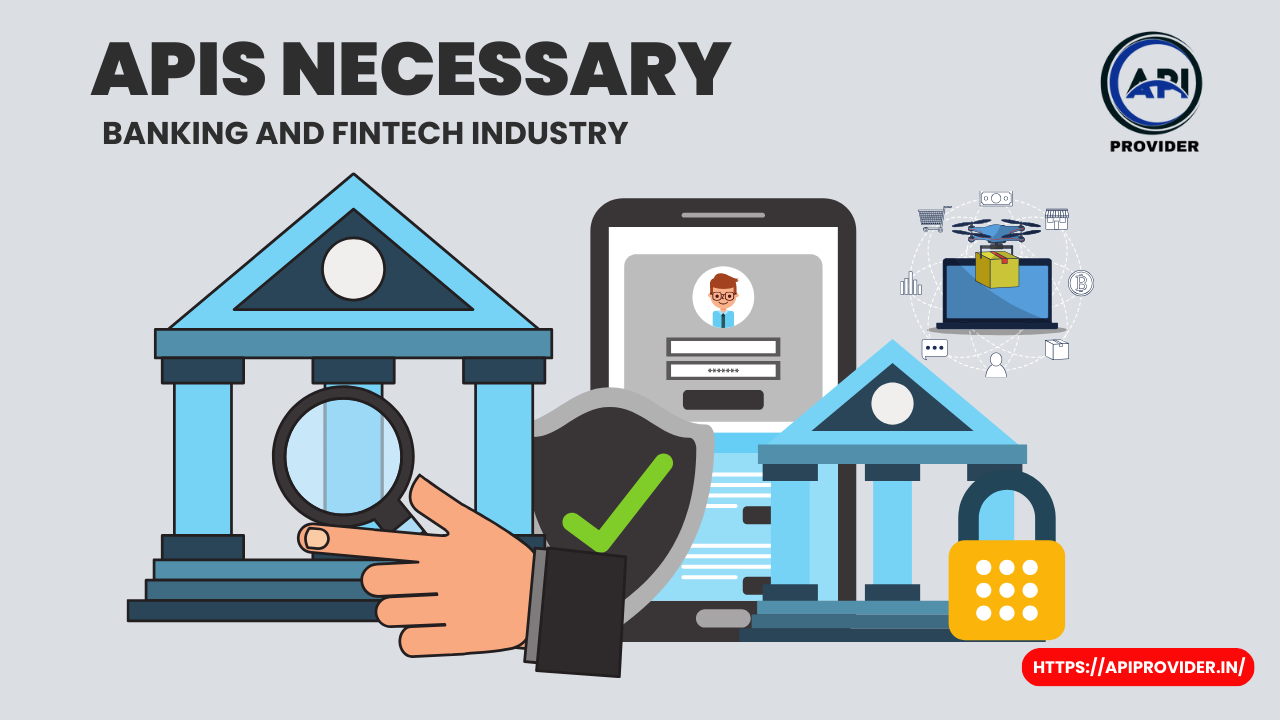APIs Necessary For Banking And FinTech Industry:
In the rapidly developing landscape of banking and financial technology (FinTech), Application Programming Interfaces (APIs) have emerged as indispensable tools. These powerful tools facilitate seamless communication and data exchange between different software applications and systems, revolutionizing how banks and FinTech companies operate, innovate, and serve their customers.

What Are Banking APIs?
Banking APIs, or Application Programming Interfaces, are sets of rules and protocols allowing different software applications and systems in the banking industry to communicate. These APIs facilitate the seamless exchange of data and functionalities between various banking platforms, such as mobile banking apps, online banking portals, payment gateways, and back-end systems. In simpler terms, banking APIs act as bridges that enable different banking technologies to work together harmoniously, ultimately improving efficiency, enhancing customer experience, and driving innovation within the financial services sector.
What Is A Financial API?
A financial API, short for Financial Application Programming Interface, is a software interface that enables communication and data exchange between different financial systems and applications. Essentially, it’s a set of rules and protocols that allow financial software programs to interact with each other, facilitating tasks like retrieving financial data, executing transactions, and accessing various financial services. Financial APIs play a crucial role in the FinTech industry, enabling innovation, integration, and automation across various financial products and services, including banking, payments, investments, and insurance.
Understanding APIs in Banking and FinTech
At its core, an API is a set of rules and protocols that allows different software applications to communicate with each other. In banking and FinTech, APIs enable the integration of diverse systems and platforms, such as mobile banking apps, payment gateways, risk management software, and customer relationship management (CRM) systems.
Enhancing Customer Experience
One of the primary reasons APIs are essential in banking and FinTech is their ability to enhance customer experience. By leveraging APIs, financial institutions can offer a wide range of services and features seamlessly integrated into third-party applications. For example, APIs enable customers to check their account balances, transfer funds, and make payments directly from their favorite mobile apps or websites, without the need to switch between multiple platforms.
Driving Innovation and Collaboration
APIs play a pivotal role in fostering innovation and collaboration within the banking and FinTech industry. By exposing their functionalities and data through APIs, financial institutions can empower third-party developers and FinTech startups to build innovative solutions and services. This open ecosystem encourages experimentation and accelerates the pace of innovation, ultimately benefiting both businesses and consumers.
Streamlining Operations and Increasing Efficiency
In addition to improving customer experience and driving innovation, APIs help banks and FinTech companies streamline their operations and increase efficiency. By enabling seamless integration between disparate systems and applications, APIs eliminate the need for manual data entry and redundant processes. This automation not only reduces operational costs but also minimizes the risk of errors and delays, allowing financial institutions to focus on core activities and strategic initiatives.
Enabling Personalization and Customization
Personalization is key in today’s banking and FinTech landscape, and APIs play a crucial role in enabling personalized experiences for customers. By leveraging APIs to access and analyze customer data, financial institutions can gain valuable insights into individual preferences, behaviors, and needs. This data-driven approach allows them to offer tailored products, services, and recommendations, enhancing customer satisfaction and loyalty.
Strengthening Security and Compliance
Despite the numerous benefits they offer, APIs also raise concerns about security and compliance, particularly in highly regulated industries like banking and finance. However, when implemented properly, APIs can strengthen security and compliance measures. By adopting industry-standard security protocols and implementing robust authentication and authorization mechanisms, financial institutions can ensure that sensitive data is protected and regulatory requirements are met.
Conclusion
In conclusion, APIs are essential for the banking and FinTech industry due to their ability to enhance customer experience, drive innovation, streamline operations, enable personalization, and strengthen security and compliance. As technology continues to advance and consumer expectations evolve, APIs will remain a fundamental building block for creating innovative solutions and delivering value-added services in the financial services sector. Embracing APIs not only allows banks and fintech companies to stay competitive but also empowers them to adapt and thrive in an ever-changing landscape.
